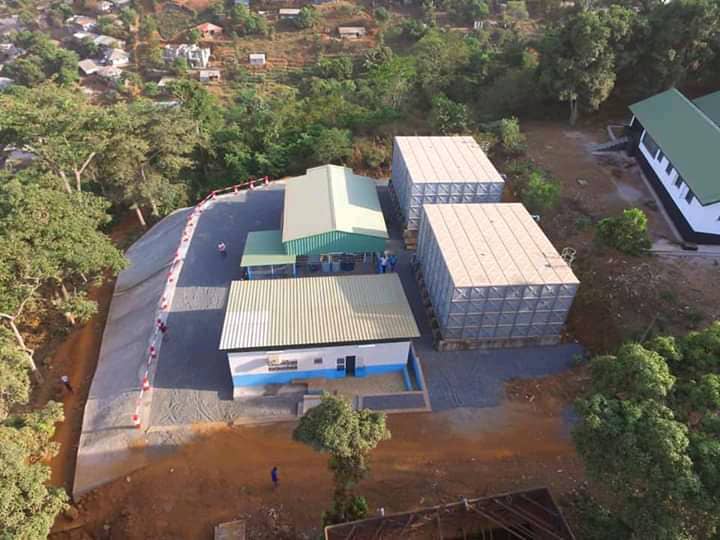By Isha S. Mansaray
Post-civil war Sierra Leone has been suffering from lack of a major nationwide water supply system.
Therefore, to maintain the country’s water security system, the National Water Resources Management Agency was enacted by an Act of Parliament through the Ministry of Water Resources as a way of securing sufficient water management in the country. Their mandate is to protect and safeguard the management of water resources, including protecting and securing the catchment areas. Starting its operationalization in 2019, the agency also has the mandate to setup a water management regulatory system.
“The Mount Aureol water catchment areas, the Number 2 river catchment area, among many other catchment areas nationwide, are deteriorating.”
Engineer Ken Tommy, the manager of the National Water Resources Agency, made this disclosure during the weekly government press briefing held in the conference room of the Ministry of Information and Communications at Youyi building in Freetown.
Meanwhile, catchment areas are secured places or reservoirs where rainfall flows into a river or lake.
According to Tommy, the agency had spent an incredible amount of money establishing the Mount Aureol catchment area.
“We used over $2 million dollars to establish the Fourah Bay College catchment area, but now we can’t boast of water supply in that area,” he added.
After the Fourah Bay college hostels went over a decade unused, the students will finally have the privilege to access them. However, one of the major challenges students wanting to use the hostels might face is a poor water supply system.
According to Tommy, the amount of students the Fourah Bay College will be hosting might supersede the availability of the water supply system.
“Fourah Bay College that will be hosting over about 2,000 or more students, we did a water supply system, but it is now completely dried up,” he said.
He posited some reasons the catchment areas dried up; “The water systems get completely dried up due to encroachment and destruction of the vegetation around the catchment areas.”
He also highlighted the specific activities that made people destroy the vegetation at the catchment areas. “People are constructing new houses around these catchment areas.”
In an exclusive interview with Francis Davies, the FBC estate officer, he indicated that the college has been experiencing a water crisis for the longest time especially from getting supplies from the FBC catchment at Gloucester. “For a very long time, we have been having issues getting sufficient water supply.”
Also confirming some of the reasons the catchment areas easily dry up, Davies said the GUMA Valley Water Company, the National Water Resources Agency, the Ministry of Water Resources and he went on a tour to ascertain the reasons for the water shortage at the catchment areas.
“We found out the water at the catchment areas gets easily dried up due to human activities.”
However, in an effort to manage the water system between the people at the Gloucester – Mount Aureol catchment area, Mr Davies added that they have established a timetable for using the water at the catchment area.
“We have held meetings with the headman and others to work together; and we have established time to use the water. The community people at Gloucester have their own time to use the water for their basic needs and to water their crops, while FBC also have their own time to get water supplies from the catchment. The community people at Bathurst take the water usage from 6-10am, and FBC takes it from 10am to 5pm. Also, from 5pm to 7am is for the community people to use the water; and from 7pm to 6am is for FBC to get water supply.”
Mr Davies also added that the water from the dams especially from the Mount Aureol catchment area at Gloucester is treated before being supplied to the necessary beneficiaries at the FBC.
He added, “The raw water that comes from these dams goes through a purification process. It goes through a processing plant that purifies water, and it is then secured in a closed tank for good consumption.”
According to engineer Osman Lamin Bangura, the FBC water superintendent, there are stages of the water purification process.
He explained, “We collect raw water from rains and the Moyiba and Mount Aureol water dams, and store the raw water in a sedimentation tank, which is the first stage of the purification process. It goes next to the filtration tank that has valves that extract large particles from the water; and then it goes next to the hydrated lime tube which neutralises the water and then goes next to the aluminium sulphate tube which coagulates the water; that is, by depressing the dirt and then the chlorine tube which disinfects bacteria and then supply the water to the tank that is meant for the pure water.”
Mr Bangura also added that the process is very costly as it burns lots of fuel pumping water from the Mount Aureol water dam, which travels on a hill supplied through water pipes.
In order to implement a new strategy to manage the water crisis at FBC, the clerk of works at the university, Mr Wilfred Momoh, said that the college intends on proposing a better option that will enable the campus to get a more sufficient water supply.
“We are intending to write a project as ‘plan B’ for the campus to get a second reservoir to collect raw water during the raining season so that we can get adequate water after the rains.”
According to him, there is already land reserved at the campus for the proposed reservoir, adding that all they need is sponsorship for funding to boost their efforts in constructing the new reservoir at the campus.


